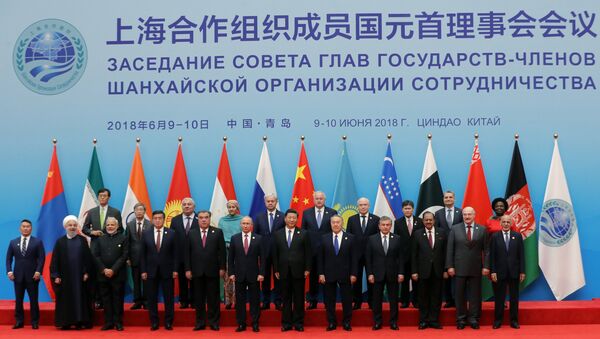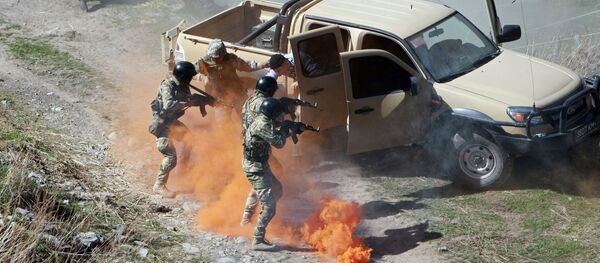The streets of Qingdao are not as busy as usual: most businesses in the Eastern Chinese coastal city are closed and residents have received paid vacations. Those who chose to stay in town during this year's two-day SCO leaders' meeting had the chance to go to large shopping malls, which remained open or spend time with their families in Qingdao's parks and squares.
READ MORE: SCO States Rule Out Warfare in Resolving Syrian Crisis — Summit Declaration
Right in front of the local administration building, there is a huge logo of the Shanghai Cooperation Organization and slogans written in three languages — Chinese, Russian and English. The sign quickly became a popular spot for family photo-ops.
City buses with SCO summit slogans, flags of Russia, India and other bloc members everywhere, locals making selfies in front of newly-built SCO sign close to meeting venue. pic.twitter.com/sqsznrGvGw
— Denis Bolotsky (@BolotskySputnik) 10 июня 2018 г.
The streets are being heavily guarded by police, SWAT teams and plain-clothes agents. But other than that, things look peaceful: no wailing sirens, no tear gas or masked radicals in the streets, as often happens during G20 or NATO summits. Instead, dozens of locals gathered to film the motorcades of the Russian, Chinese and Belarussian presidents or take photos of the freshly planted flower beds.
In most cases you'd be better off if you're NOT filming a presidential motorcade. But in Qingdao, even with security measures in place-ok to do it, no sirens/stress. Traffic police open the crossing the minute Alexander Lukashenko arrives at his hotel. https://t.co/Dm1ydNydpf
— Denis Bolotsky (@BolotskySputnik) 10 июня 2018 г.
If you compare the coverage of this year's G7 summit and the SCO meeting by various international media outlets, the differences are striking — both in their agendas and in the way journalists reacted to these events. The Indian media is exploring the advantages of the SCO's multi-polarity after the country's first year as a full-time member. The front pages of Chinese newspapers on Sunday were dedicated solely to the Qingdao meeting.
Chinese newspapers on Sunday: Everything about the SCO meeting, including Saturday’s Gala and massive fireworks show in the harbor plus spectacular views of the city’s skyscrapers from the sea. pic.twitter.com/iRH6VYAfFR
— Denis Bolotsky (@BolotskySputnik) 10 июня 2018 г.
Western TV and newspapers seemed to have been totally consumed with "the clash of the Titans" at the G7 in Canada's Charlevoix, where heads of state engaged in a dispute over the bloc's policies, followed by another round of anti-Russian rhetoric. The SCO summit barely made it into the western MSM's headlines, even though the Shanghai pact's influence is growing annually.
Western mainstream media called the Qingdao meeting “a regional summit” without mentioning that the SCO is the largest regional organization in the world when it comes to geography and demographics. (infographics from SCO website) pic.twitter.com/VybqOR0OXg
— Denis Bolotsky (@BolotskySputnik) 10 июня 2018 г.
Even though Shanghai cooperation organization has not made any decisions this time, when it comes to accepting new full-time members, key players, such as Russia, continue to engage in a dialogue with nations that currently have observers' status in the organization. Russian President Vladimir Putin held talks with Iran's Hassan Rouhani on the sidelines of the Qingdao event and expressed support for Tehran's desire to obtain full SCO membership.
Vladimir Putin met with President of Iran Hassan Rouhani #SCO https://t.co/6KdjDtyq7j pic.twitter.com/qf8iSAy2NT
— President of Russia (@KremlinRussia_E) 9 июня 2018 г.
As the counterparts of Russia and Iran are becoming increasingly unpredictable, both Moscow and Tehran are looking for support from reliable partners, such as China, India and other SCO members. According to Chinese President Xi Jinping, the organization, which was originally formed to serve as an example of multi-polarity where powerful nations co-exist despite their differences, sees common security as one of its key goals:
"With the number of member states increasing we are becoming stronger, and the international community pays more attention to the SCO and places hopes on it. So, we also have a growing need for security, stability and regional prosperity"






